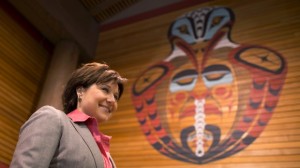When thinking of the business mod el canvas at a macroscopic scale, I initially didn’t consider issues regarding the First Nations as relevant in managerial decision-making. However, after scrutinizing Christie Clark’s efforts to amiably improve the government’s relationship with the First Nations, it seems like political factors permeate the BC government’s aims for greater cooperation and interactions between the Indigenous. Seen through peaceful negotiations and arbitration, this is similar to developing the “key partners” section in the model canvas.
el canvas at a macroscopic scale, I initially didn’t consider issues regarding the First Nations as relevant in managerial decision-making. However, after scrutinizing Christie Clark’s efforts to amiably improve the government’s relationship with the First Nations, it seems like political factors permeate the BC government’s aims for greater cooperation and interactions between the Indigenous. Seen through peaceful negotiations and arbitration, this is similar to developing the “key partners” section in the model canvas.
While HP’s decision to de-merge into their individual B2B software services portfolio and their unit of computer- printer sales may not be an example of either national politics or First Nations disputes, there may be several implications on a deeper level. The article speaks of HP’s near “obligation” to split their company in a very positive light, but citing reasons such as “fast-paced technological market growth” and “long-term value for shareholders” seems too much an oversimplification.
printer sales may not be an example of either national politics or First Nations disputes, there may be several implications on a deeper level. The article speaks of HP’s near “obligation” to split their company in a very positive light, but citing reasons such as “fast-paced technological market growth” and “long-term value for shareholders” seems too much an oversimplification.
I’d go far enough to say that politics and key relationships have a large part in this revelation, as compared to the First Nations disagreements – but this case speaks to internal corporate culture politics. It wouldn’t be too far-fetched to suggest that there could be a clash of interest within management or “hiccups” in operations that prompted a de-merger, but it all boils down to streamlining those important external key partnerships keeping a business (or Native party) afloat.